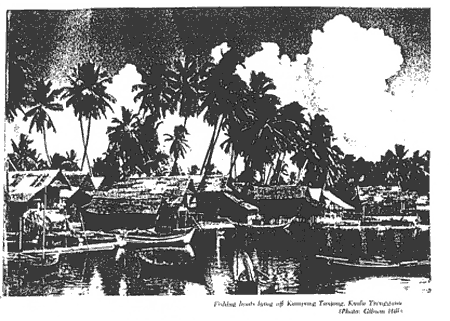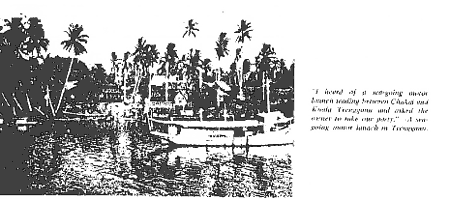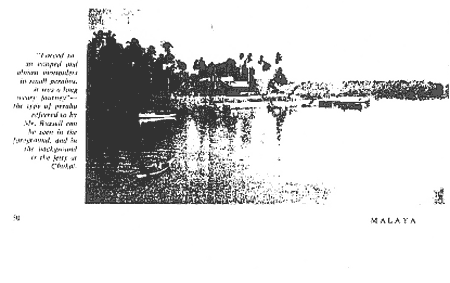
For the descendents of Richard Dearie and his son John Russell
A Journey to Trengganu some 40 Years Ago By D. O. RUSSELL
(Written in April 1958)
A REGULAR AIR SERVICE FROM KUALA LUMPUR AND a motor road from Kuantan – how easy it must be to get to Kemaman and Kuala Trengganu these days.
Early in 1918 when I was a mining engineer with my brother’s firm of engineers and consultants in Kuala Lumpur we heard of a mine for sale in the Sungei Cherul valley in the Kemaman area which might be worth buying. My brother was interested and in due course our informant, Mr. Cheong Fatt and I, with my mining overseer and a gang of four experienced men, sailed from Singapore in the Siam Steam Navigation Company’s s.s. Mahidol for Chukai, the port for Kamaman in southern Trengganu.
A very stiff monsoon was blowing and no sooner had we left the lee of the land than we ran into mountainous seas. It was so rough when we arrived off the mouth of Kamaman River that the ship could not enter, and we had to make do with the perahus which came out to meet the ship. Boarding them proved a most difficult proposition when at one moment they were 10 feet down and the next were up level with the deck. Somehow we managed it, and the party and equipment were transferred and paddled up to Chukai where we had to spend the night. Mr. Cheong was very pleased with himself when he found a motor-boat for hire which he reckoned would take us to the mine in half the time perahus (1) would need.



Starting early next morning we made quite good progress despite the broken-down condition of the launch. The engine had a single cylinder on top of which, apparently, was a leaky stopcock, for a small lad was employed to keep up pressure by pressing on it a wad of cotton-waste. Even so the exhaust fumes were fairly strong and after some miles proved too strong for him and he collapsed on the bottom of the launch. We stopped do douse him in the river, but to no avail. My overseer then produced a small glass phial, took out a red pill, ground it between his fingers, and placed the powder in a cigarette paper. With this rolled into a cylinder he blew the powder up the lad’s nostrils. In a matter of seconds he came round and we were able to proceed on our way he still engaged in maintaining pressure with the cotton-waste.
We went on for some time longer, but as there had been a severe drought in the district water was very low and we were soon scraping the bed of the river. We then all had to take it in turns to help by pushing the launch up-stream, a long and arduous task which went on for hours.
Just as it was getting dark we saw a bungalow on a hill and half-a-mile ahead, and here I was glad to find a man named Gow, whom I had met some years before when he was planting at Bentong. He invited us to stay the night we off-loaded the equipment and made the launch secure, After I had had a bath and a couple of pink gins, we started dinner but my troubles for the day were not over, for during the meal the leg of my chair went through the bark floor and in trying to save myself I grabbed the tablecloth bringing down with it, and smashing, the bulk of my host’s china and glass.
Next morning Gow advised that the river was so low that it would be impossible even to push the launch so we paid it off, and he put us on to a track leading towards the mine. It was a 12 or 15 mile walk, slow going as we had to carry all our gear, and it was around dusk when we arrived.
The Sikh watchman on the place agreed to put me up and left me to have my meal. Soon he came back into the hut wearing only a loin cloth and proceeded to make chupattis. For these he took a lump of unleavened dough in his right hand and beat it flat against the left side of his naked torso, and then changed to his other hand and side my unwillingness to share the finished article was hard to explain away to my host !
Next day after an inspection and quick assessment of the possibilities of the mine we decided to visit another property which Mr. Cheong knew of in the area, in the Jabor valley, I think. On the following day, therefore, we set out along a very poor jungle path with all our equipment. Mr. Cheong quite lost his way and just as it looked like our having to spend a night in the jungle, we heard the sound of mining operations, and there found a man named Peters, who was very pleased to see us for I was the first European he had met for over a year when he had last been in Singapore. After a night with him we set out very early to return to Chukai, in time we thought to catch the steamer to Singapore next day. Forced to sit cooped and almost motionless in small perahus, it was a long weary journed, and well after mid-night when we arrived.
In the morning we learnt that because of the changed schedules the Siam Steam ships were no longer calling at Chukai except by prior arrangement. Hardened though I was to disappointments on this trip, this was the last straw, but I heard of a sea-going motor launch trading between Chukai and Kuala Trengganu and asked the owner to take our party. It was Friday, his Sabbath, and at first he said it would not be possible, but as it was imperative for me to get to Kuala Trengganu on the morrow to catch the weekly steamer to Singapore I got him to agree, after some hard bargaining, to take us for $150, on condition that I was permitted to take on passengers and retain any fares paid by them.
In the later afternoon we set out into a very rough sea, so bad that at times I thought we should go under, but we survived to arrive at Kuala Trengganu about 10 a.m. only to learn that the steamer had arrived late the night before and had sailed soon after, we had probably passed her on our way.
That meant another week’s delay, softened to a considerable extent by the kindness of the British Adviser, J. L. Humphreys, who had me to stay with him until my ship came in. Trengganu had then no telegraphic communication with the outside world so I could not get word to my brother about all this. When the ship did come it was, unexpectedly, in the early hours of the morning and she would have left again almost immediately had not Humphreys send word to the captain asking him to wait for our arrival. Hurriedly our party assembled and we scramble aboard and set out for Singapore. With the monsoon winds astern we made good speed and there seemed every chance of our arriving in Singapore the next day in time for me to get the night mail to Kuala Lumpur. Again my hopes were dashed, for the port was closed when we arrived after 6 p.m. as a war-time security measure. Being unable to go ashore until the morning meant that we should miss the day train as well.
Thank goodness, that really was the last of my disappointments, except that an assay of the samples taken from the mine showed that while the ore was of good quality and in fair quantity, it was insufficient to justify Russell & Co. buying the property in view of the difficulties of communications.
And who should know better about those than I?
Notes:
(1) Perahu is a Malay word for small boat.